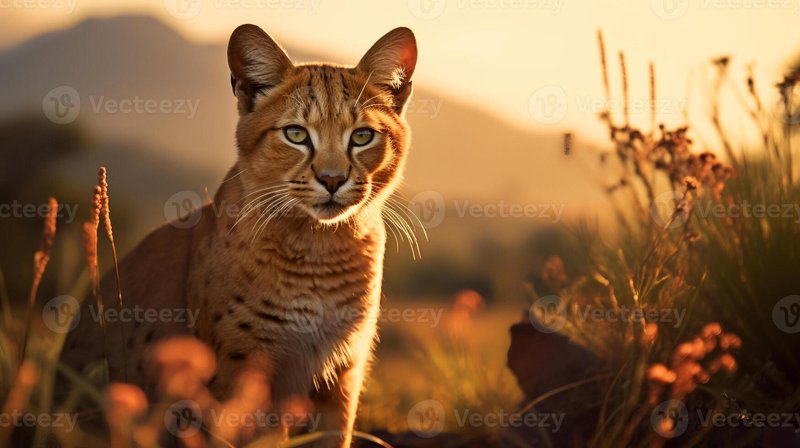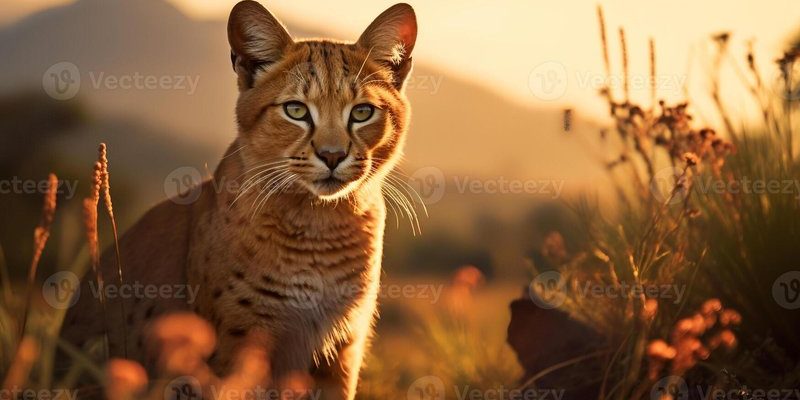
The African Golden Cat is a fascinating and elusive creature that roams the dense forests of Central and West Africa. Imagine a cat that’s not just a charming presence but also a skilled hunter, blending seamlessly into its surroundings. This medium-sized feline has a mysterious aura around it, which makes it all the more intriguing to learn about. As you delve deeper into its life and habits, you’ll uncover just how unique these cats truly are.
These cats are not your typical house pets; they thrive in the wild, navigating their lush habitats with grace and agility. With a striking appearance that varies from rich golden to deep auburn fur, the African Golden Cat showcases one of nature’s more beautiful innovations. But despite their striking looks, these animals are often overshadowed by their more famous relatives, such as lions and leopards. Let’s take a closer look at the life of the African Golden Cat, diving into their habits, habitats, and conservation status.
Physical Characteristics
The African Golden Cat is a medium-sized feline, making them a bit smaller than your average domestic cat but far more robust. Typically, these cats weigh between 8 to 19 kilograms (about 18 to 42 pounds) and measure around 60 to 100 centimeters (24 to 39 inches) in length, not including the tail. Their muscular build and strong limbs help them move through the thick jungle undergrowth with ease. One glance at their tawny fur gives you a sense of their ability to camouflage perfectly in their woodland habitats.
What sets the African Golden Cat apart is not just their size but also their unique coloration. While most individuals sport a golden or deep rust coat, some may have spots or stripes, similar to other wild cats. Their large, rounded ears are designed for acute hearing, making them proficient hunters. This fascinating mix of traits makes them well-adapted to their jungle homes, where stealth and agility are crucial for survival.
Habitat and Range
You might be curious about where exactly the African Golden Cat calls home. These cats prefer dense tropical rainforests, lush woodlands, and sometimes even hilly areas. Their range stretches from the forests of Western Africa to the Congo Basin, with notable populations in countries like Gabon, Cameroon, and the Democratic Republic of the Congo. The thick vegetation provides them with both cover and hunting grounds, essential for stalking their prey.
However, their preferred habitat is rapidly disappearing due to deforestation and human encroachment. With vast stretches of their home being cut down for agriculture and logging, the African Golden Cat faces significant pressures. This loss of habitat impacts not only their survival but also the delicate ecological balance of the forests they inhabit. It’s heartbreaking to think that these magnificent creatures are losing their homes, isn’t it?
Diet and Hunting Behavior
The African Golden Cat is predominantly a carnivore, feasting on a diverse diet that includes small to medium-sized mammals, birds, and sometimes even reptiles. They are skilled hunters, using their keen sense of sight and hearing to detect potential meals in the dark understory of the forest. With a mix of stealth and speed, they typically hunt alone, pouncing on unsuspecting prey with precision.
One interesting fact is that these cats are known for their adaptability in hunting strategies. Depending on the season and availability of food, they might switch their target from small rodents to larger mammals like duikers, a type of antelope. By adjusting their hunting tactics, they manage to thrive even in changing environmental conditions. Adaptability is key for their survival in the wild.
Reproduction and Life Cycle
When it comes to reproduction, African Golden Cats have a relatively low birth rate. A female typically gives birth to one to four kittens after a gestation period of about 70 to 75 days. These kittens are born blind and rely heavily on their mother for protection and nourishment during their early weeks. As they grow, around three months old, they begin to venture out and explore their surroundings, learning vital survival skills.
Family bonds are strong in these cats. Mothers will often care for their young for up to a year, teaching them how to hunt and navigate their environment. This nurturing behavior is essential for the kittens’ survival, especially in a challenging habitat where threats from larger predators loom. It’s quite remarkable how much care goes into raising the next generation of African Golden Cats.
Conservation Status
Sadly, the African Golden Cat is currently listed as Endangered on the IUCN Red List due to habitat loss and poaching. Efforts to protect their environment and reduce poaching incidents are critical for their survival. Conservation programs aim to establish protected areas and raise awareness about the importance of preserving these stunning animals and their ecosystems.
Organizations dedicated to wildlife conservation are working tirelessly to ensure that the African Golden Cat does not fade into obscurity. By promoting sustainable practices and engaging local communities, they hope to create an environment where both the cats and people can thrive. It’s crucial for us to support these efforts, as every little action contributes to the preservation of this extraordinary cat and its forest home. Together, we can help make a difference.
Interesting Facts
| Scientific Name: | Caracal aurata |
| Size: | 60-100 cm (24-39 in) in length |
| Weight: | 8-19 kg (18-42 lbs) |
| Habitat: | Tropical rainforests and woodland areas |
| Diet: | Carnivorous; small mammals, birds, and reptiles |
| Lifespan: | Average of 10-15 years in the wild |
Behavior and Social Structure
The African Golden Cat is a solitary animal, which might remind you of some other wild cats. They typically roam their territory alone, marking it with scent markings to communicate with potential mates or rivals. In stark contrast to lions, these cats prefer their own space and only come together during the mating season. This solitary nature helps them avoid competition for food and resources in their dense forest homes.
When you observe them in the wild, you’ll notice some fascinating behaviors. They are mostly nocturnal, meaning they are most active at night when they can stealthily stalk their prey. You might even catch a glimpse of one making a leap from a tree branch or navigating through thick underbrush with incredible agility. Their keen senses and hunting skills are finely tuned, allowing them to thrive in their challenging environment.
Threats to Survival
Despite their remarkable adaptations, African Golden Cats face several threats that jeopardize their survival. One of the main challenges is habitat destruction due to logging and agriculture, which strips away the forests they rely on. As their homes shrink, so does their access to food and safe places to live.
Additionally, poaching poses a significant threat. These cats may fall victim to traps set for larger game or be hunted for their beautiful pelts. The combination of habitat loss and illegal hunting creates a double whammy for their populations, making conservation efforts all the more vital. It’s a tough reality that these cats must navigate in order to survive.
The African Golden Cat is a remarkable example of nature’s beauty and resilience, facing enormous challenges in an ever-changing world. With their striking appearance and fascinating behaviors, they capture our hearts and inspire us to work towards their conservation. By learning about these elusive creatures, we can all play a part in ensuring their future. Whether it’s supporting wildlife conservation initiatives or spreading awareness, every action counts. So, let’s keep the conversation going about the African Golden Cat and the importance of protecting their habitats.
FAQ
What is the habitat of the African Golden Cat?
The African Golden Cat primarily inhabits tropical rainforests and dense woodlands. They thrive in areas where there is ample cover to stalk prey, showcasing their adaptability to dense vegetation. Unfortunately, their habitat is rapidly declining due to logging and agricultural expansion.
How does the African Golden Cat hunt?
These cats are skilled nocturnal hunters, using their keen vision and acute hearing to detect prey in the dark. They often use stealth and ambush tactics, pouncing on smaller mammals, birds, and reptiles. Their solitary hunting style helps them maintain the element of surprise.
Are African Golden Cats social animals?
Generally, African Golden Cats are solitary creatures. They prefer to roam their territories alone, coming together only for mating. This solitary behavior reduces competition for food and resources, which is essential in their dense forest habitats.
How endangered is the African Golden Cat?
The African Golden Cat is classified as Endangered on the IUCN Red List. Their populations are declining primarily due to habitat loss and poaching. Conservation efforts are crucial to ensure their survival and restore balance to their ecosystems.
What do African Golden Cats eat?
These cats have a carnivorous diet, primarily feeding on small to medium-sized mammals, birds, and sometimes reptiles. They are opportunistic hunters and will adjust their diet based on seasonal availability of prey.
How long do African Golden Cats live?
In the wild, African Golden Cats typically live around 10 to 15 years. Factors such as habitat quality and threats from poaching and human activity can impact their lifespan significantly.
What are the main threats to African Golden Cats?
The primary threats to African Golden Cats include habitat destruction due to logging and agricultural expansion, as well as poaching for their pelts. These challenges make conservation efforts increasingly important for their survival.
Can African Golden Cats be kept as pets?
While they are captivating creatures, African Golden Cats are not suited for domestic life. They are wild animals with specific needs related to their natural habitats, diet, and social structures. Keeping them as pets would be both impractical and unethical.
What conservation efforts are in place for African Golden Cats?
Conservation initiatives include establishing protected areas, raising awareness about the species, and promoting sustainable practices in local communities. Organizations work to reduce poaching and habitat destruction to help stabilize and grow the African Golden Cat populations.
What role do African Golden Cats play in their ecosystem?
African Golden Cats are important predators in their ecosystems, helping to maintain the balance of prey populations. By regulating the numbers of smaller mammals and birds, they contribute to the overall health of their forest habitats.

